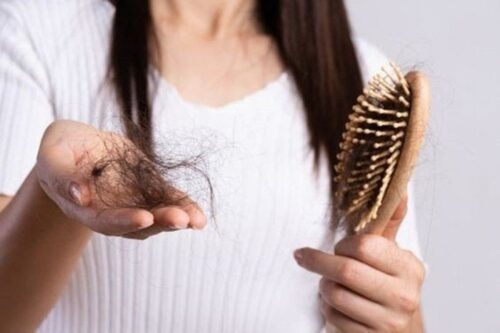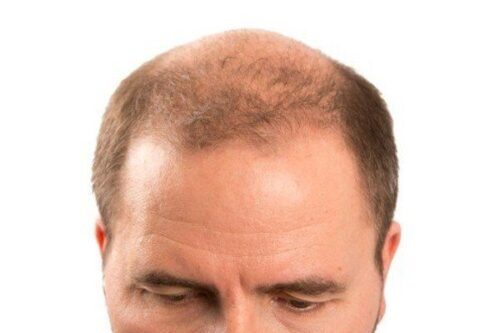Hair loss is a concerning issue for many individuals nowadays. There are various factors contributing to weak, dry, brittle, and easily falling hair. One of the key causes of hair loss is nutritional imbalances. So, what nutrients are essential for preventing hair loss? Let’s explore this topic in the following article to uncover the answers and effective treatment methods.
1. Identifying Nutrient Deficiencies in Hair Loss
Physiological hair loss is the natural process where the body sheds old, weak hair to make room for new, healthy hair. However, excessive hair loss occurs due to a lack of essential nutrients. This can result in losing more than 100 strands of hair per day, leading to thinning and decreased aesthetic appeal of the hair. This condition is known as pathological hair loss.
Hair, much like other organs in the body, requires nutrients for growth. When adequate nutrients are not absorbed, hair becomes susceptible to damage and breakage. If left untreated, this condition can worsen over time. Excessive hair loss can indicate deficiencies in the following nutrients:
1.1. Hair Loss Due to Vitamin Deficiencies
Vitamins play a crucial role in maintaining healthy hair. Various nutrients promote quick and robust hair growth.
- Vitamin A: including retinol, retinal, and retinyl ester, supports strong vision, immune system enhancement, and cell differentiation. Vitamin A is essential for the rapid growth and development of hair follicles.
- Vitamin C: is a powerful antioxidant that prevents oxidation of low-density lipoprotein and neutralizes free radicals that damage cells. It enhances the immune system and aids in iron absorption and utilization, making it vital for individuals with iron-related hair loss.
- Vitamin E: maintains natural moisture in hair and skin. A deficiency can lead to dry, brittle hair that’s prone to breakage.
- Vitamin B: Vitamin B7 (Biotin) participates in the formation of hair structure, ensuring its strength. Vitamin B6 supports continuous metabolic processes in hair follicles. Insufficient intake of vitamin B can result in weak, brittle hair.

1.2. Hair Loss Due to Mineral Deficiencies
- Protein: Hair’s main component, keratin, is composed of protein. Protein is also necessary for collagen production, which contributes to hair’s natural shine and strength. Protein deficiency leads to dry, brittle, and easily breakable hair.
- Calcium: Besides promoting bone health, calcium is essential for strong, resilient hair, reducing hair breakage. Postpartum women often need increased calcium intake, leading to hair loss.
- Zinc: An essential trace element, zinc can be acquired through daily diet. Hair loss is a common symptom of zinc deficiency, which can be mitigated by sufficient supplementation.
- Iron: Iron is crucial for producing red blood cells and facilitating nutrient transport to hair follicles. A lack of iron reduces red blood cell production, depriving hair of essential nutrients.
- Silica: Silica deficiency impairs nutrient absorption, leading to weak, brittle, and easily falling hair.
- Selenium: This mineral helps detoxify heavy metals and combats oxidative stress, protecting hair follicles from damage.
- Sulfur: A component of hair keratin, sulfur nourishes hair and promotes faster growth. A deficiency leads to slower and weaker hair growth.

Supplement essential minerals for healthy hair
2. Supplementing Nutrients for Healthy Hair
If experiencing abnormal hair loss, consult a healthcare professional to determine the exact cause before proceeding with effective treatments. When hair loss results from nutrient deficiencies, consider the following approaches to restore your hair’s health:
2.1. Maintain a Balanced Diet
Consume foods rich in the following nutrients to improve hair health:
- Protein sources: Eggs, cheese, milk, fish, shrimp, various meats, beans, mushrooms, and pumpkins.
- Minerals: Beef, crab, shrimp, oysters, tuna, liver, nuts, potatoes, beets, sweet potatoes, and oats.
- Vitamin-rich fruits and vegetables: Tomatoes, oranges, grapefruits, pomegranates, bananas, and carrots.
- Omega-3-rich foods: Olive oil, egg yolks, avocado, salmon, and gac fruit oil.
2.2. Use Hair Care Products
Apart from dietary changes, consider using hair care products that reduce hair loss and stimulate growth from within. Combining internal and external hair care strategies is the most effective way to protect your hair. If you lead a busy life, you can opt for a comprehensive hair care system like Alika Platinum, which saves you time and effort while achieving thicker, healthier hair.
Alika Platinum consists of shampoo, conditioner, and serum produced using advanced technology. It employs Liposome technology and advanced active ingredients such as Redensyl, Baicapil, and Capixil, which effectively reduce hair loss and stimulate growth.
According to Swiss-based Induchem Institute’s statistics, Redensyl can stimulate up to 28,000 new hair strands after three months of continuous use. The Alika Platinum system is highly praised by dermatologists for its effectiveness and safety.

The Alika Platinum system provides comprehensive benefits:
- Optimized formula for both genders.
- Outstanding hair loss reduction, noticeable after just one week.
- Support for fast and robust hair growth within eight weeks.
- Direct impact on hair follicle stem cells, promoting deep and healthy hair growth.
- Formation of an invisible protective layer that slows down hair aging and damage.

Phases of Hair Recovery and Growth Using Alika Platinum:
- Phase 1: Reducing Oil and Hair Loss
Nutrients and vitamins penetrate the scalp, nourishing new hair and revitalizing existing follicles.
- Phase 2: Repairing Weak and Thin Hair
Promotes rapid growth and thicker hair strands.
- Phase 3: Supporting Fast and Strong Hair Growth
Speeds up nutrient absorption into hair roots, ensuring fast, healthy hair growth.
In conclusion, this article aims to provide valuable insights into your daily hair care routine. By understanding the factors that cause hair loss and the effects of essential nutrients, you can take effective measures to prevent and treat hair loss. Don’t forget, maintaining a healthy lifestyle, eating well, and using the right hair products will help you have thick, shiny, and healthy hair.




